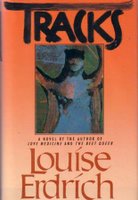 17. Tracks, Louise Erdrich. Fiction, 2-22, pp. 226
17. Tracks, Louise Erdrich. Fiction, 2-22, pp. 226 The voice of the American Indian, written with all the power and richness that poetry can convey, inhabits this book. Tracks is Louise Erdrich’s fourth book; of the books preceding it, two were novels, the first, Jacklight, was a collection of poetry. And it is as a poet that Erdrich establishes herself as a novelist.
Both her previous novels, Love Medicine and The Beet Queen, hinted at Erdrich’s talent as a writer. In Tracks her talent—to breathe life into characters, to establish a sense of place and to create a narrative filled with subtlety and tension—emerges fully formed.
By focusing on the lives of a handful of Chippewa’s early in the 20th Century, Erdrich deftly charts the slow, but certain erosion of Indian culture. The old beliefs cannot stand before the greed and the machinery, or even the good intentions, of the white man.
Erdrich’s strength is the subtlety with which she traces the Chippewa’s loss of land, pride and sense of self. She does not preach or hector the reader. Instead, she traces the slowly disintegrating lives of people we have come to care about. Ultimately, sadly, the Chippewa betray one another, completing the work the white man started.
Tracks is a lyrical book of great pain, sadness and regret. It is a novel written by a poet who understands the old ways of the Chippewa.


That sounds like a delightful read!
ReplyDelete